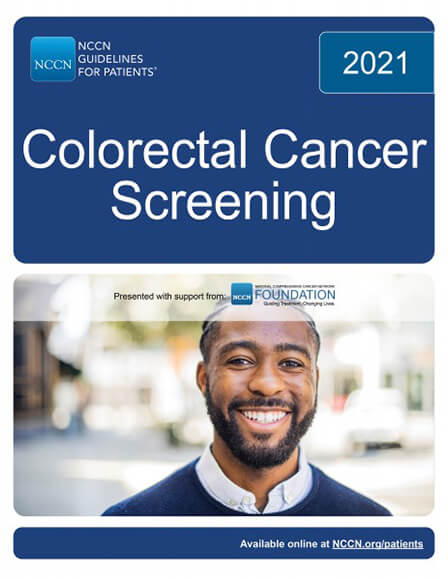
Mega Doctor News
by National Comprehensive Cancer Network® (NCCN®)
Newswise — PLYMOUTH MEETING, Pennsylvania— The National Comprehensive Cancer Network (NCCN®) today announced the publication of new NCCN Guidelines for Patients®: Colorectal Cancer Screening. Colorectal cancer (CRC) is the fourth most frequently diagnosed cancer in the United States, with an estimated 104,270 new cases of colon cancer and 43,230 new cases of rectal cancer in 2021, and an estimated 52,980 deaths this year.[1] Screening can reduce the rate of death by catching CRC at an earlier, more treatable stage, and can reduce overall cancer incidences by detecting and removing pre-cancerous polyps. This new, free guide for patients and caregivers breaks down the different ways screening can be done and explains the recommended timing according to the latest research.

“I was lucky that my colon cancer was diagnosed early enough to be successfully treated,” said Heather Matt, a four-year CRC survivor who was first diagnosed at age 35. “I want everyone to know about the importance of screening and how, when caught early, it may save you from having a very different outcome. A little discomfort today can ensure your tomorrow.”
Importance of screening
Accurate information about cancer screening is particularly important in light of the COVID-19 pandemic—which has seen reduced screening numbers projected to result in increased late-stage diagnoses. More on NCCN’s message that “Cancer Won’t Wait and Neither Should You” can be found at NCCN.org/resume-screening.
“CRC screening has been shown to be one of the most effective prevention tools for a very common cancer that we know of,” said Reid M. Ness, MD, MPH, Associate Professor of Medicine, Vanderbilt-Ingram Cancer Center, and Chair of the NCCN Guidelines Panel for Colorectal Cancer Screening. “Studies show that we’ve reduced incidence rates by 40% since 1980, when screening was first recommended in the U.S. At the same time, it’s important to follow the latest evidence to make sure we’re applying screening to the people who can see the most benefit, while not putting anyone at unintended or inappropriate risk from diagnostic procedures and treatment.”
“Recommended screening significantly reduces cancer-related deaths; the numbers are astounding,” agreed panel Vice-Chair Xavier Llor, MD, PhD, Professor, Yale Cancer Center/Smilow Cancer Hospital. “This new patient guideline from NCCN offers a better understanding of the scientific research for the larger community. It provides a foundation for shared decision-making with patients and caregivers, so we find the right screening fit for everyone.”
NCCN Guidelines for Patients are based on the NCCN Clinical Practice Guidelines in Oncology (NCCN Guidelines®), which are determined by multidisciplinary teams of experts from across NCCN Member Institutions. NCCN Guidelines® are the recognized standard for clinical direction and policy in cancer care and the most thorough and frequently updated clinical practice guidelines available in any area of medicine. The patient versions are presented in easy-to-read language and format—with charts, images, and a glossary of medical terms—and were found to be among the most trustworthy options for cancer patients seeking information online, according to an independent study.
“For more than 15 years, our organization has worked with smart, relentless patients and caregivers who are looking for reliable information and answers about their treatment plans; many won’t stop until they find them,” said Anjee Davis, MPPA, President of Fight CRC. “We are proud sponsors of the NCCN Guidelines for Patients: CRC Screening because this is an important tool that empowers patients with the information they need to discuss their care with their doctors. We hope this resource empowers patients to choose the right screening option and get screened!”
Recently updated recommendations
In early 2021, the NCCN Guidelines for Colorectal Screening were updated to recommend screening begin possibly as young as 45-years-old for people at average risk and includes additional recommendations for those with higher risk. Additionally, some follow-up screenings can safely be delayed for seven to ten years. The research is evolving rapidly, and even primary care physicians may not be up-to-date on the latest expert consensus.
Drs. Llor and Ness both stressed that patients at any age who experience symptoms should be evaluated for colorectal cancer. Some of those symptoms include:
- rectal bleeding
- changes in bowel habits
- persistent stomach pain
- fatigue
- and unexplained weight loss
The panel also wanted to honor the significant contributions from longtime NCCN Guidelines Panel Chair, Dawn Provenzale, MD, of Duke Cancer Institute, who passed away earlier this year.
Free digital versions of the NCCN Guidelines for Patients: Colorectal Screening are available at NCCN.org/patient guidelines and via the NCCN Patient Guides for Cancer App, thanks to funding from the NCCN Foundation®. The growing library of NCCN Guidelines for Patients includes nearly 60 frequently updated books for patients and caregivers covering most major types of cancer, including colon and rectal cancers. There are additional guides covering cancer-related distress, nausea and vomiting, and survivorship (both healthy living & cancer-related late and long-term effects), plus special considerations for adolescents and young adults across all cancer types.
Learn more and help support these and other resources for people with cancer and their caregivers at NCCN.org/patients.








